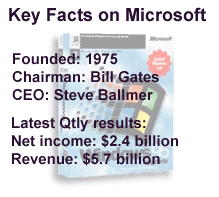|
Microsoft fires back
|
 |
May 10, 2000: 11:00 p.m. ET
Response to government remedies asks judge to reject breakup
|
NEW YORK (CNNfn) - In a harshly worded court filing, Microsoft Corp. asked a federal judge Wednesday to reject the government's proposed breakup of the company, calling such a move an "extreme remedy not even hinted at in the government's complaint."
Instead, Microsoft (MSFT: Research, Estimates) proposed a series of changes to its business practices that would give personal computer makers more leeway to configure the Windows desktop and the start-up sequence computer users see when they turn on their machines.
|

|
VIDEO
|
|
 Microsoft asked the court to reject a plan to divide the software giant in two, proposing restrictions on its business practices instead.
Microsoft asked the court to reject a plan to divide the software giant in two, proposing restrictions on its business practices instead.
|
|
Real
|
28K
|
80K
|
|
Windows Media
|
28K
|
80K
|
|
In a filing made with the U.S. District Court for the District of Columbia, Microsoft said that Judge Thomas Penfield Jackson's previous findings of fact and conclusions of law in the landmark antitrust case "do not justify the government's radical request to split Microsoft into two separate companies," and that the government's request for such a split is "particularly inappropriate given the manner in which the case was tried."
Microsoft has claimed that the government presented new evidence in the remedy proceedings that was not part of the original case. As expected, the software maker insisted in its reply that the government's proposed remedies went too far and that its own solution would be more effective.
"In stark contrast to the relief sought in its complaint, the government seeks to rip apart the company that until recently had the largest market capitalization in the world—an extreme remedy not even hinted at in the government's complaint," Microsoft's filing said. "The law and the facts do not support such a radical step."

Steve Ballmer, Microsoft's chief executive, reiterated that his company would better off in one piece rather than two and likened the government's plan to splitting up a rock band because of its popularity. [471KB WAV] [471KB AIFF]
In April, Judge Jackson concluded that Microsoft maintained its monopoly power over PC operating systems by anticompetitive means and attempted to monopolize the Web browser market. In addition, Jackson concluded that Microsoft violated antitrust laws by tying its Web browser to its operating system. The judge asked both the government and Microsoft to submit proposed remedies to the court.
Two weeks ago, the Justice Department and state attorneys general from 17 of the 19 states suing Microsoft submitted their remedy proposal to Jackson, recommending that the company be split into two separate entities, one of which would contain its Windows operating systems and the other of which would contain its applications, such as the popular Office suite.

Microsoft said that if Judge Jackson plans to proceed with the breakup, the company will need additional time to prepare its appeal. The company proposed that a remedies hearing be held on Dec. 4 if Jackson plans to consider dividing the company. Under Jackson's current timetable, the government has one week to respond to Microsoft's proposed remedy and there will be oral arguments from both sides in open court on May 24.
Microsoft's proposed restrictions
As an alternative to the more dramatic step of splitting up the company, Microsoft proposed a series of restrictions on its business practices it said would address the government's concerns about competition in the market for Web browsers and PC operating systems. Those proposed concessions included:

Microsoft proposed that these restrictions remain in place for four years, versus the 10 years that the government's proposed decree would be in force.
"Nothing in the record justifies such a lengthy term for relief in this case," Microsoft said of the government's 10-year time period. "Most of the conduct challenged by the government occurred over a two- or three-year period, and much of that conduct stopped long ago."
Reactions to Microsoft's filing
Iowa Attorney General Tom Miller, who leads a working group of the states suing Microsoft, issued a statement calling Microsoft's proposed remedies "inadequate."
"These measures would not have prevented the serious violations of law found by Judge Jackson, and they are not adequate remedies to assure that the law is not broken in the future," Miller's statement said. "The states also believe this case should continue to move steadily ahead to a conclusion and not be derailed or dragged out by Microsoft."
The Justice Department issued a similar statement, saying that Microsoft's proposal "fundamentally fails to repair the damage to competition caused by Microsoft's illegal acts, or to prevent Microsoft from committing similar violations in the future."
"Investors should view both the DOJ's and Microsoft's remedy proposals as the two end points in the spectrum of possible outcomes," said CIBC World Markets analyst Melissa Eisenstat. "However, given Judge Jackson's negative stance toward Microsoft throughout the entire legal proceeding, we suspect that the remedy judgment will more closely align with the government's proposal than Microsoft's version."
According to a Gallup poll released Wednesday, most Americans oppose splitting Microsoft into two companies. The Gallup Organization said that although 49 percent of those polled believe Microsoft is a monopoly, 54 percent oppose a breakup, while only 34 percent are in favor of the plan, and 12 percent had no opinion.
Microsoft shares dropped 1-5/8 to close at 66-3/16 on the Nasdaq Wednesday. Shares declined another 3/16 to 66 in after-hours trading on MarketXT. 
|
|
|
|
|
|
Microsoft
|
Note: Pages will open in a new browser window
External sites are not endorsed by CNNmoney
|
|
|
|
 |

|

